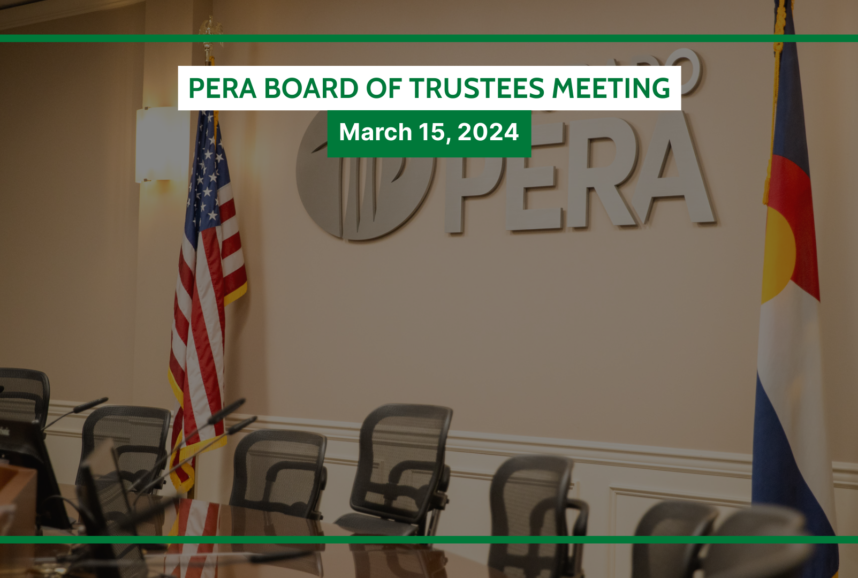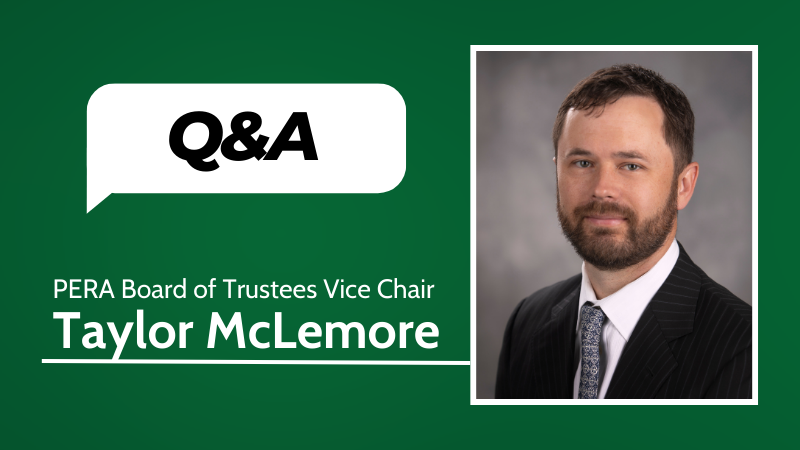In this story:
- PERA casts about 60,000 votes on company ballots every year
- PERA’s Board regularly updates its Proxy Voting Policy, which guides staff who review proposals
- The Board last updated this Policy in February
As a shareholder of billions of dollars in thousands of publicly-traded investments, PERA casts a lot of votes on company ballots.
In a recent story, we followed one ballot through the entire process—from the day it arrived in Denver to the day the election results were announced. “Voting is our way to communicate to companies and to other shareholders,” said Luz Rodriguez, PERA’s Senior Analyst in the Investment Stewardship division.
Guiding this entire process is the Board’s Proxy Voting Policy. The first edition of this document was created in November 1979. Since then, the Board has made updates 19 times. While the policy changes to meet the needs of evolving issues, the goal remains the same. As the opening to the Policy states:
“We will continue to seek alignment of corporate management interest with PERA’s investment interests, with the ultimate aim of encouraging companies to adopt sound practices in aspects of business that can enhance profitability and long-term shareholder returns.”
Issues That Matter
The 60,000 votes PERA casts annually cover a wide array of subjects. Although it’s a detailed document, the Policy does not specifically address every issue that comes to ballot.
“Governance has always been our focus,” Rodriguez said. “The core governance issues of a company include things like director elections, executive compensation, and audit.”
Over the years, the ballot topics the Policy covers have grown. The Board updates the Policy for a variety of reasons, including: changes to government or industry regulations; industry trends; the need for further clarification of an existing policy; an uptick of a certain issue on company ballots; and new or more data on an issue.
Crafting a good policy takes work, too. “The policy needs enough guidance to be useful but enough flexibility to do a proper analysis of each issue,” Rodriguez said.
An Addition to the Policy
The Board last updated the Policy in February 2021. One topic on the agenda: Human capital management. As Rodriguez explained: “Interest has been growing about how companies are managing the relationships existing throughout a business: Who are their suppliers? How are they managing employees? How do they interact with their customers? How are they impacting the communities in which they operate?”
It’s a complicated topic. But the COVID-19 pandemic underscored the importance of human capital management in markets, business, and communities. “Companies are confronting social externalities of their businesses that were once difficult to conceptualize,” Rodriguez said.
For example, effective hiring and retention practices at a company can lead to long-term financial benefits and can lead to resiliency when confronted with unforeseen events. The inverse is true as well. Rodriguez said that investors are increasingly considering a company’s human capital management when thinking about its long-term profitability.
Human capital issues can present real financial risks and opportunities to a company, and are appearing on more and more ballot proposals. “This isn’t about taking a stance,” Rodriguez said. PERA staff reviews each proposal in its own context. “We might support a proposal at one company but vote against the proposal at another one.”
So what does staff look at when analyzing a proposal? “Proposals need to be well-targeted and relevant to the company’s operations, and seek financially material disclosures” Rodriguez said. “We need to be able to assess how the company is managing risks and opportunities related to human capital management. We do not support proposals that are overly prescriptive or overly burdensome.”
Voting with Purpose
PERA does not exist to change the way businesses operate. And, while PERA does cast a large number of votes every year, it can’t singlehandedly dictate the outcome of an election. But voting is still a crucial part of the investment operations at PERA.
Voting is part of being a responsible, engaged investor. When the ballots come in, PERA staff must be prepared to vote on every issue, whatever the issues happen to be. The goal of every vote is to align corporate interests with long-term investor interests. Investors benefit from business practices that drive long-term financial performance. And at PERA, these results ultimately benefit PERA members and retirees.
StewardshipThe practice of overseeing or managing something entrusted to one’s care. PERA’s approach to investment stewardship is focused on ensuring the financial sustainability of the fund that pays benefits to retirees and beneficiaries.




